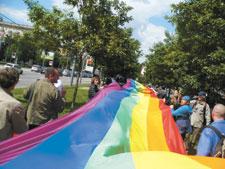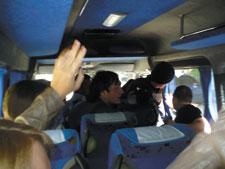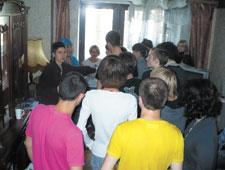
The march lasts only as long as it takes police to close in, but it is long enough to unfurl a huge rainbow banner and for the international press to catch a few pictures. Credit: Andy Thayer

Marchers escape to waiting vans, which pull away even before the doors are shut, as police bear down. Credit: Andy Thayer
For the first time in the history of Moscow Pride protests, there were no arrests and no beatings. The action earned press coverage around the world.
Andy Thayer, a US activist for gay and lesbian liberation, was there and blogged an account after events unfolded.
“The level of commitment and dedication that is required of the local activists in Moscow is just light years beyond that which you see in big-city North American Prides,” says Thayer over the phone from Chicago. “For all the millions of dollars in funding that our US-based national gay and lesbian organizations get, it is appalling the trivial amounts of resources they commit to LGBT people in other parts of the world. How can we as North American activists ask for solidarity for our struggles when we’re oblivious to those of other people?”
Below is an excerpt from Thayer’s blog.
****
For the last few days, Andy Harley has been spreading misinformation about plans for Moscow Pride through his blog on UK Gay News. He’s throwing the authorities and anti-gay thugs off track, giving false details and fake locations for our action.
Why the diversions? The Russians explain to us that their aim this year is to avoid mass arrests. So many were arrested last year; for some the consequences were very serious. Instead our aim will be to hold a public demonstration just until the police arrive, then run like hell, blend into crowds and rendezvous later.
9:30am: Russian and Belarussian lesbian and gay activists have been arriving at one of several secret rendezvous flats for the last half hour. Everyone is asked to keep voices to a whisper and to leave their shoes at the door. There is great concern that the number of people gathered in this small residential flat will arouse suspicion, that someone in the building will call the police.
There are no ego trips or other bullshit among our Russian and Belarussian friends. Gay rights is not a hobby for them as we often see in the self-satisfied West. The stakes are too high for casual participants to stick around the movement long.
9:50am: “Pride participants are forming small groups across the city and are heading to the centre, in the direction of the Kremlin,” Harley blogs. “Andy Thayer and Louis Georges Tin went first. They were followed by Peter Tatchell and Sergey Androsenko, the organizer of Minsk Pride.”
In reality, I’m bravely sitting behind the keyboard in a comfy chair in the rendezvous flat. Harley, sitting right next to me, is supposedly blogging from a café near the Kremlin. Harley tells me that Russia Today has started gullibly parroting his blog, sending cops and thugs madly off in all directions.
10:10am: Things can best be described as organized chaos. Lots of very small groups all over the downtown area are heading toward the real march area. Harley blogs to lure anti-gay thugs to the city centre where street traffic will make it very difficult for them to get to the real action once it begins.
10:30am: The Russians and Belarussians have just had a meeting, all in Russian. Nikolay Alexeyev gave some of us English speakers some rough details of the whole plan last night, but they’re keeping us in the dark about some of the new tweaks. Last year radical changes were made to the action plan at the last minute. Alexeyev himself is not here because he can’t safely travel in public right now. He is well known to the authorities. We’re told our action begins in about an hour and a half, right outside our secret flat.
11:12am: I’m told to gather my shoes but not to put them on yet. We can’t have dozens of stomping feet on the floors above our downstairs neighbours.
11:35am: The big European news agency Agence France-Presse has been following Harley’s blog for nearly two hours now. We’re likely to leave any time now.
11:53am: Seven minutes before the scheduled action, we’re still in the flat. Our coats and shoes are on. I’ve followed proper pre-arrest protocol: use the toilet, limit liquid intake for the previous hour. I’ve got a nice package now, a Pride flag crammed down the front of my pants. There are lots of last-minute instructions and discussions, all in Russian. I trust my friends and know I’ll be told what I need to know, when I need to know it.
12:07pm: My temporary Russian cell phone rings for the first time. It’s movement leader Nikolai Alexeyev’s partner. He asks me why we’re delayed. I tell him I have no idea and pass the phone to Anna, the leader of the group in the flat. We are apparently waiting for someone outside to do something. I suspect we might be waiting for the press to arrive. It’s a tricky proposition because the police are following them. With their bulky cameras, media stick out like sore thumbs.
12:29pm: Harley receives a text message: “Activists report that city hall, Pushkinskaya Square and the office of the EU are locked by police and packed with OMON [riot police].” I find it hard to believe that we will all avoid arrest.
12:37pm: Another message to Harley: “Everything is on plan.”
1:07pm: One last tweet before I sign off: Moscow — “Pride action delayed. Police swarming downtown area. Action WILL go forward!”
Flash forward to the action: We got word that the police were closing in, and we began running with the banner. We probably ran about a quarter of a mile with it before those who had the banner quickly wrapped it up, and people started running in a few different directions. I just followed people. We piled into a van, as it was already moving. It took us around the city for a little way, dumped us at a metro stop, and we eventually made our way back to the flat.

 Why you can trust Xtra
Why you can trust Xtra


